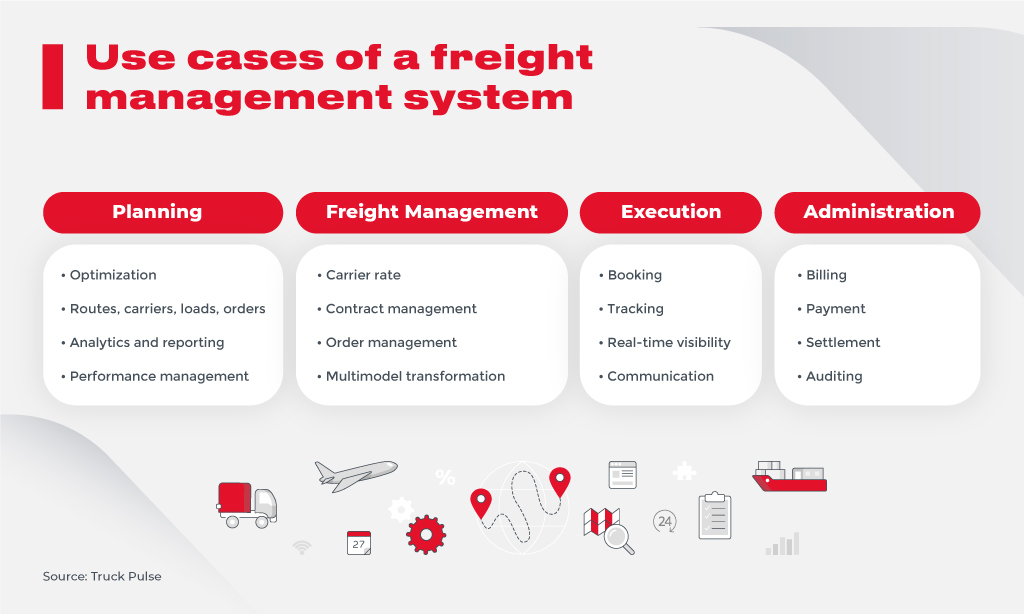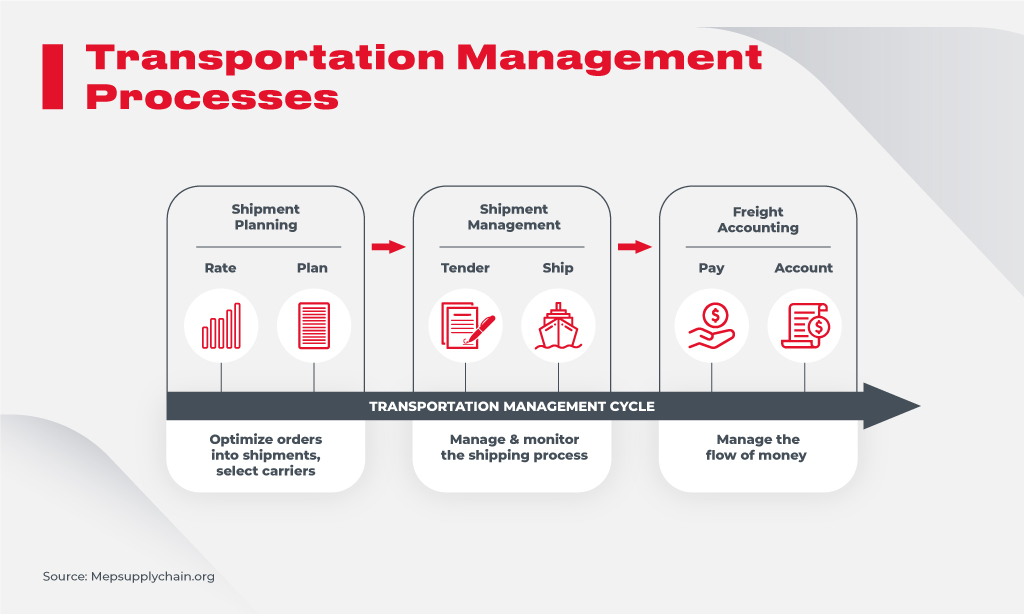Freight Management Software: Choosing the Best Transportation Options to Increase Revenue
Innovecs is involved in creating innovative and useful digital solutions and has substantial expertise in the field of freight management software development. In this blog, we are sharing the statistics, facts, and cases of the efficient FMS implementation for cargo planning, shipments optimization, and freight cost reduction.
To compete in a fast-changing business environment and gain loyal customers, utilizing freight management software will truly come in handy. Custom-made freight management software can reduce freight costs via:
- improved performance analysis;
- increased inventory and warehouse efficiency;
- and more visibility throughout the whole supply chain and freight management operations.
The market for freight management systems is growing: in accordance with market research by MarketsAndMarkets.com, it’s expected to reach $17.45 billion in 2023.

The drivers of such dynamic market growth include:
- fast-increasing international trade and the necessity to control in-time freight delivery options for better customer satisfaction
- increased supply chain visibility
- emergence and growth of advanced freight transportation techniques (e.g., RPA, AIoT, prescriptive shipping, etc.)
- a boost from logistics management software thanks to blockchain and big data implementations
- the necessity to go green and maintain a company’s sustainability to stay ahead of the competition
- carriers, as well as 3PL providers, are striving to gain the highest cost sensitivity possible to gain more customers and increase revenue
As Forbes noted in its last review, the transportation market “felt the impact of COVID-19 to a lesser extent” in comparison with the consumer packaged goods (CPG) or food and beverage industry. According to the review, the main reasons for such a trend are:
- e-commerce is still growing due to lockdown and necessity to buy from home
- an increased number of freight management applications applying new technologies
- a “proven ROI” option: Forbes called the implementation of a transportation management system (TMS) “a less risky investment” proving the fact with Research ARC Advisory Group
Given such a stable freight management market growth, let’s shed some light on how freight management software works, its main processes, and how to choose the market’s most suitable options to drive your business success and keep up with the market.
Understanding the Value of Freight Management Software
Effective supply chain management becomes possible when the company understands that it must satisfy rapidly changing customers’ requirements. This understanding is the only way to gain new markets, scale the business for more profit, boost ROI, and strengthen your competitive advantages. The key is not only to transform your transportation business but to understand why you want to do it.
The next step is to find the right people who will help you realize your understanding and vision. Chethan Kote, Quality Assurance Manager at Castle Precision Engineering, in his TEDx Talk emphasized quite a valuable thought: coding is important to create effective tools for supply chain management—and quality assurance is a part and parcel of successful product performance—but people are still the most demanded asset.
We agree that successfully developing, testing, and releasing custom freight management applications depends on the team of experts that you invite to build or improve your freight management software.
Innovecs’ teams specialize in automating transportation business processes and delivering high-performing freight management software (FMS). They offer solutions within the following areas.

What Challenges Can FMS Address
Lotus Containers, a leading container supply provider, outlines the following top 2022 challenges for freight management software, applying:
- focus on the visibility of the freight delivery intermodal components (e.g. drivers’ retention during the intermodal delivery transport change: containers to trucks);
- supply chain localization for faster satisfaction of shipment needs(customers are willing to have next-day delivery for an affordable price);
- a boost to supply chain agility (FMS grants more visibility, eliminates risks, and decreases errors);
- efficient inventory and delivery forecasts;
- and attracting several delivery partners and managing them effectively.
Let’s look through the main FMS introduction challenges in the modern business environment.
Keeping all operations synchronized
Freight management is one part of the entire logistics operations scale. Nevertheless, businesses should pay enough attention to managing freight transportation in connection with other logistics operations.
It is quite challenging to create integration-focused systems to effectively manage customer relations (contracts, orders, returns) and control inventory, and smartly use multimodal delivery (air, ocean, truck shipments). A custom freight management software built around specific business needs can cover all aspects of transportation and ensure the aligned operation of all processes.
Preventing miscommunication
Another challenge is communication between all stakeholders. Daily contact channels that traditional freight companies use are mixed and slow. They still include mails, phone calls, and manual search for freight platforms and solutions.
This is quite inefficient and challenging, potentially resulting in numerous human errors, response delays, and sometimes miscommunication. Custom freight management software can include the functionality for keeping communication concise without allowing sensitive data to leak.
Increasing visibility over deliveries
ShipNext, a shipping platform, illustrated the freight management challenge with an example that ocean transporting covers about 80% of global trade, but still remains the least transparent mode of shipping.
In the video, they describe technologies such as natural language processing, machine learning, or AI to help in processing shipping-related data for instant freight negotiations and delivery management.
A freight management system developed upon request and matching the needs of your business can process real-time databases to match one or more pieces of freight to a certain shipment modality by monitoring its efficiency. It integrates carrier rates, contract and order management, booking, and tracking into one synchronized logistics process, under which shippers and receivers optimize their collaboration.
The Profile of a Good Freight Management System
When our team designs and develops freight management software, they consider all transportation processes and interconnections between them. They create functionality for smart contact between parties, electronic bills, easy and fast documentation flow management, freight transactions tracking, and more.

To achieve successful outcomes and deliver value, we have a special checklist for a good freight management system. It should:
- optimize shipment planning and simplify carriers’ choice;
- have real-time delivery chain visibility (vehicle tracking, fleet management);
- deal with the financial risks in freight accounting;
- comply with the international regulations; and
- ensure flawless collaboration between the stakeholders, customers, and carriers.
Working with all of these goes hand-in-hand with data collection and analytics. Between carrier selection, rates monitoring, collaboration terms, and price negotiation—or any other aspect—freight management software must deal with huge volumes of data and be able to extract, structure, visualize, and analyze it.
Benefits of a Freight Management Software
Custom freight management software based on precision accuracy and relevancy contributes greatly to your entire logistics system, mitigating the risks of human intervention, errors, or corruption.

Redwood Logistics outlines the following benefits of FMS introduction to your freight business:
- making customer service better: FMS automates internal operations, which helps meet the needs of the customers more precisely and react quickly to their changing demands;
- cloud systems, analytics based on AI and ML, and proper integration with the existing supply chain management systems eliminate the “guesswork” in carrier selection; and
- helps to grow your business’ scalability potential.
In the past year, Allied Market Research stated that these benefits of freight management automation lead to market growth at a CAGR of 9.6% from 2020 to 2027 as more and more companies go global due to digitizing transportation processes and implementing FMS for better performance.
Overview of Freight Management Solutions
The market offers a variety of ready-made, cloud-based solutions, and platforms such as CargoWise One, Magaya Supply Chain, KeepTruckin, GoFreight, as well as the possibility to outsource custom freight management software development partnering with such leading development companies as Innovecs.
Outsourcing provides higher flexibility and agility to build solutions to cover all your needs and develop as many features as you want on demand. However, no matter what you choose, you should understand the objectives.
For example, GDS Freight International service promises to manage all end-to-end freight processes: freight forwarding, customs clearance, and charter flight auditing. Longitude World provides SaaS freight services that cover the full freight services cycle for easier business scaling and capturing new markets. GoRamp, as a cloud-based transportation management service, assists in order and warehouse time slot management to mitigate human error risks influencing delivery time.
The list goes on, but in some cases, business owners are aware of the fact that businesses need custom freight management solutions because of specific needs or processes. If you implemented any solution in testing mode and concluded it didn’t satisfy all your business needs, it’s high time to talk to an expert team to outsource custom FMS aligning with your business vision. Innovecs’ expertise in the field of logistics management software can come in handy to:
- arrange top security measures in freight transportation;
- increase system productivity;
- achieve better accuracy in project and delivery management; and
- reduce costs via process automation.
Freight management software developed by Innovecs can plan the routes, manage documents flow, collect data throughout the transportation line, and deliver valuable insights for your business development, all while tracking freight movements in real-time.
Custom solutions are powerful not only to tackle current freight transportation problems, but to pick up, analyze, and store big data for further strategic conclusions, making reasonable business decisions, and tracking the progress of ROI and performance scaling.
Conclusion: Additional Strengths FMS Grants to Your Business
If you are striving for business sustainability and digitalization, freight management software implementation is a reasonable way to invest money.
Automating freight transportation processes requires a business owner to unite the whole supply chain (storage, warehousing, inventory, transport, audit, and control) into a perfectly working logistics system, where:
- shipment planning and freight accounting are aligned;
- additional safety and security of smart contracts and documents management occur;
- the choice of the best rate and the best service ensure more revenue;
- and optimized track and trace processes enable risk decreasing and better customer satisfaction;
- a company gains more supply chain visibility; and
- automation leads to more useful and quicker insights into how to make FMS more efficient.
Most of the marketing research in the field stresses the fact of the freight market growth: only the Freight Brokerage market size is expected to reach $77,770 million in 2027. This figure may prove any business owner to pay attention to additional automation and investments necessary to go digital in freight transportation.
Both startups, as well as market leaders, are striving to implement technologies in freight management. Fizyr performs a powerful freight pick and place system employing AI possibilities. Indian Invento Robotics addresses market challenges with service robots for customer interactions. Locus Robotics in Washington performs greatly with their robots for servicing the entire e-commerce pool of processes. DHL provides overall consulting and in-depth freight delivery analyses to observe the needs of your company and proposes strategic freight network design for better profit.
If, after reading these facts, you’ve thought it’s time to implement your own freight management system, you are welcome to ask any questions to Innovecs’ experts on how to go digital in freight transportation.